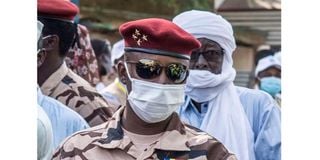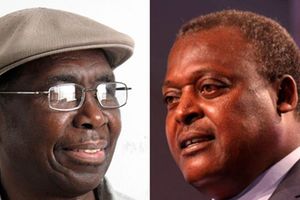Deby to Deby: Strange ‘monarchies’

Four Star General and head of the Republican Guard in Chad, Mahamat Idriss Déby Itno, 37, son of Chadian President Idriss Deby Itno is seen at a polling station in N'djamena on April 11, 2021.
What you need to know:
- It waits to be seen if Gen Mahamat Idriss Deby Itno will continue as president beyond the 18-month transitional period.
- No First Daughter — or, indeed, First Lady — however much they are favoured by the father, has so far succeed a president.
An African president has just been killed by masculinity. Chad’s strongman Marshal Idriss Deby Itno, who led the country for 31 years, was killed on the frontline in a battle against rebels in the north, the Army announced Tuesday.
Deby, 68, was recently declared the winner of a rigged presidential election that was boycotted by most of the opposition and would have given him a sixth term in office.
The former military officer, who seized power in 1990, often jumped into military fatigues to join troops. On Monday he cancelled a victory rally to visit troops on the frontline after rebels based across the northern border with Libya and advanced south toward the capital N’Djamena.
It’s likely that without a disputed election, and therefore the need to gain legitimacy from another front by presenting a strong masculine and brave figure in the trenches with the troops, Deby would be alive.
Under Chad’s suspended constitution, the Speaker of Parliament would have exercised provisional presidential powers and led the country’s transition. The army put paid to that, responding swiftly by dissolving parliament, declaring a state of emergency and installing Deby’s son, Gen Mahamat Idriss Deby Itno, as interim president of the Transitional Military Council, the junta they stitched together quickly.
African First Sons
Gen Deby was commander of the Chadian forces on a United Nations peacekeeping mission in next-door Mali. It waits to be seen if he will continue as president beyond the 18-month transitional period announced by the military, but he could.
Deby Junior becomes the fourth African First Son to directly and immediately succeed his father as president. The others are Democratic Republic of Congo’s former president Joseph Kabila, who succeeded Laurent-Désiré Kabila after his assassination in 2001; Gabon’s President Ali Bongo Ondimba, who succeeded his long-ruling and flamboyant father Omar Bongo upon his death in 2009; and Togo’s Faure Gnassingbé, who took over from his cruel and superstitious father Gnassingbe Eyadema, when the dictator died in 2005.
Not counting monarchies like eSwatini, Lesotho and Morocco, two other African presidential children have gone on to become presidents. In democratic Botswana, Ian Khama, son of the country’s founding father Sir Seretse Khama, and a former Commander of the Botswana army, became president in April 2008 — 28 years after the death of his father. In Kenya, President Uhuru Kenyatta became president in 2013 — 35 years after the death of his father Jomo Kenyatta, who led Kenya to Independence in 1963.
Khama and Uhuru became president after a lot of water had passed under the bridge and were not handed the baton directly, so their cases are not central to our equation. Uhuru, Gnassingbé and Ondimba were not soldiers but Kabila, Khama and now Deby Junior were or are.
Therefore, the army is not the only path that assures immediate succession. Still, with four First Children taking over immediately from their fathers, we have enough material to predict other circumstances that might favour that transition and to prepare ourselves for more that are likely to come.
African patriarchy
A juicy political position in the ruling party or government seems absolutely critical. All these political heirs held offices in the military or government. Ondimba was senior in the ruling party and a minister. Gnassingbé was the powerful minister of Equipment, Mines, Posts, and Telecommunications. Kabila, a former mid-level rebel commander, was Chief of Staff of the Land Forces when his father died.
Clearly, African patriarchy is still a factor. No First Daughter — or, indeed, First Lady — however much they are favoured by the father, has so far succeed a president.
All of them studied at home or in a neighbouring country, at least through secondary school, before going to university abroad. The near-exception is Ondimba, who, after two years in primary school in Libreville, was carted off to private school in the upmarket Paris suburb of Neuilly, and later to the Sorbonne University. Kabila fooled around in Tanzania and Uganda. Khama went to Waterford Kamhlaba, in Mbabane, Swaziland, which is said to be easily the most “bougie” school in Africa.
In any event, spending the formative years in a school at home or in the neighbourhood seems important as you make friends with whom you can plot later to take power or keep it once you have got it.
For all the four who got power immediately their fathers fell, support of the military has been critical for succession. So, look out. A First Son in the military has a leg in. When a president sends his child to primary in the West, it is a lost cause. When he appoints him minister or the fellow wins even a minor post in the ruling party, take him seriously. If, however, he is only a businessman, however rich he might be, without playing in the political or military mud, count him out.
Mr Onyango-Obbo is a journalist, writer and curator of the Wall of Great Africans. @cobbo3





